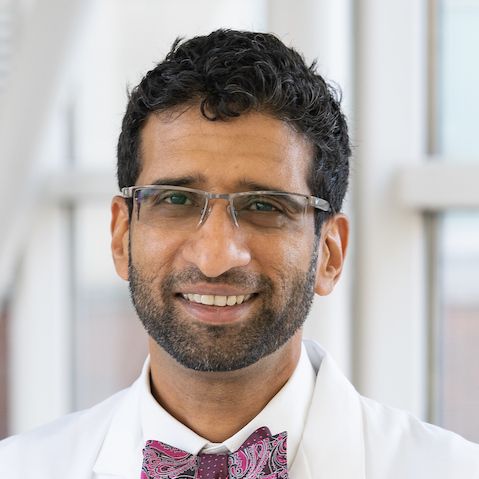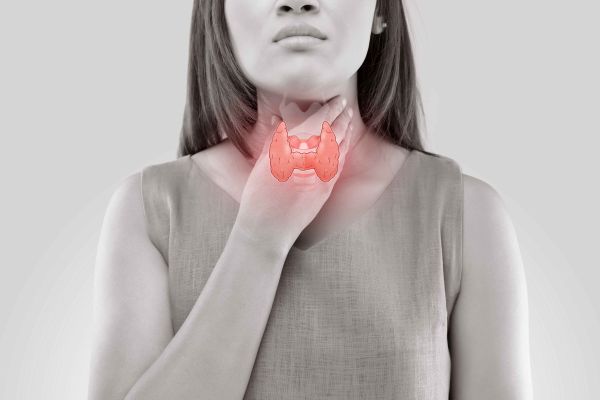An accurate diagnosis and right treatment are important
Despite its small size, the butterfly-shaped thyroid gland that sits in the front of your neck has a rather large role in important body functions. The thyroid produces the key hormones thyroxine and triiodothyronine that manage your metabolism, digestion, body temperature, mood and excitability, pulse and heart rate.
An enlarged thyroid — called a goiter — and thyroid nodules are two fairly common conditions that can occur when something is amiss with the thyroid. While the cause is usually benign (not cancer), they sometimes are the result of a cancer and it’s important to get an accurate diagnosis and appropriate thyroid treatment.
What is a goiter?
A goiter (not a gaiter, the cowl-like face covering popular in the early days of the COVID-19 pandemic) is an enlargement of your thyroid gland. It can be barely noticeable or grow quite large and affects about 5% of people in the United States. A goiter may develop alone or be made up of smaller thyroid nodules that can be benign or cancerous.
Several factors can cause your thyroid to enlarge, including certain medications, not having enough iodine in your diet, thyroid cancer, pregnancy and thyroiditis (an inflammation of the thyroid gland itself). However, a goiter is typically associated with too much or too little amounts of thyroid hormone in your body, which can result in either hyperthyroidism, an overactive thyroid, such as with Graves’ disease, or hypothyroidism where the thyroid is underactive, such as with Hashimoto’s disease.
A simple or diffuse goiter is diagnosed when your entire thyroid gland swells and feels smooth to the touch. Nodule and multinodular goiters have one or more nodules that develop inside the thyroid gland, which can make it feel lumpy and may only be detectable through physical examination or a scan.
“Simple and diffuse goiters are usually benign,” says Vishal Gupta, MD, a Head & Neck surgeon at Roswell Park Comprehensive Cancer Center. “Suspicion for cancer arises in the presence of thyroid nodules. As reference, more than 50% of adults over 50 years of age have nodules; 10% or less of these are malignant. The risk of cancer in these thyroid nodules can be assessed by using ultrasound and suspicious nodules can then be biopsied under sonographic guidance.”
Anyone can develop a goiter, but they are more common in people assigned female at birth, and who are older than 40. People with the following risk factors also may be more likely to develop a goiter:
- Obesity
- Insulin resistance
- Metabolic syndrome
- Autoimmune disorders
- Radiation exposure to the head and neck
- Personal or family history of thyroid disease
If your goiter is large, you may experience symptoms such as trouble swallowing, feeling like food is stuck in your throat or difficulty breathing.
What’s the difference between a goiter and a thyroid nodule?
While a goiter is an enlargement of the whole gland, a thyroid nodule is a lump that develops inside your thyroid gland. Thyroid nodules can be either solid or filled with fluid, and usually won’t cause symptoms. But if you can see or feel a lump and it becomes hard to breathe or swallow, it is important to take steps to find out whether the nodules could be cancer.
Why choose Roswell Park?
Our specialists work with this every day and can offer the best strategies for treatment whether the tumors are cancerous or benign.
How do you know if a thyroid nodule is cancer?
An ultrasound exam of your thyroid will give your physician a better look at the nodule and its size. Your doctor may suspect thyroid cancer if the nodules are larger than 1 centimeter (cm) and have uneven borders or little bright white spots called micro-calcifications. To find out if cancer cells are present, a biopsy may be ordered which uses a fine needle to take a small sample of cells from the lump to examine in the laboratory.
“Most thyroid cancers arise from spontaneous or sporadic mutations. There are risk factors like exposure to ionizing radiation which increases the risk of these mutations, and a small subset of thyroid cancer can be caused by hereditary mutations,” Dr. Gupta explains. Since most thyroid cancers are asymptomatic, suspicious thyroid nodules should undergo thyroid ultrasound.
Symptoms that a thyroid nodule may be cancerous include:
- Feeling that close-fitting shirt collars are becoming too tight.
- Changes to your voice, including increasing hoarseness.
- Difficulty swallowing.
- Swollen lymph nodes in your neck.
- Pain in your neck and throat.
If you are not having symptoms, your provider may recommend monitoring the situation instead of starting active treatment right away. If you are having symptoms, your primary care physician — or endocrinologist — may prescribe medication such as thyroid hormone replacement to normalize thyroid activity.
Surgery or radioactive iodine therapy may be necessary if you have a goiter that is causing serious symptoms. Surgery to correct a large goiter involves removing all or part of the thyroid gland. If the entire thyroid is removed, you may need to take thyroid medication for the rest of your life.
Why Roswell Park for thyroid disease and thyroid cancer?
It can be difficult to tell the difference between benign and cancerous thyroid nodules. That’s why it’s important to have your case reviewed by pathologists who have experience in diagnosing thyroid cancer.
Roswell Park has a team of pathologists with experience in this area, and who work closely with endocrinologists and primary care physicians in the local community to make or confirm an initial diagnosis and develop a treatment plan that works best for you.
“I believe that the important thing is not to panic once found to have thyroid nodules and/ or thyroid cancer. Most nodules are benign and, if diagnosed with cancer, most thyroid cancers are curable,” advises Dr. Gupta advises.
“The second most important thing will be accurate diagnosis and treatment. This requires experts in various fields like radiology, pathology, surgery and endocrinology. We, at Roswell Park, have years of experience and can provide all this expertise under one roof.



